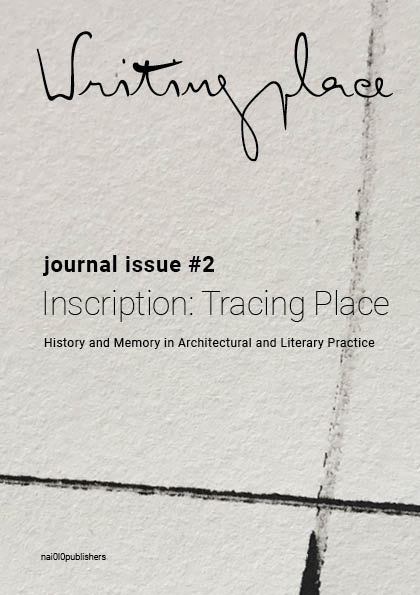Poetic Cartographies
A Literary Journey Through the City
DOI:
https://doi.org/10.7480/writingplace.2.2652Keywords:
poetry, cartography, city-reading, Juiz de Fora, literary diagnosisAbstract
‘Reading the city consists . . . [of] making the city visible through the mechanisms of language’.[1]City and writing are intrinsically linked. As a result of man’s imagination and work, the city registers and is, at the same time, the register of human experiences. Meanwhile, we, as citizens, produce – through documents, maps, photos, diagrams, plans and, of course, literature – our own records, outlining the memory of the city. Considering this point of view, it can be noticed that the reading of the city can be done on two levels: the first one, through observation and experience in loco, in an exercise similar to that of Walter Benjamin's flaneur,[2]who walks through the city and looks, touches, hears and smells the stories hidden in the corners and dark alleyways, always at a slow pace, denying the rhythm imposed by the traffic; the second one, through access to someone else’s records, that is, the contemplation of a painting or a photo, the analysis of documents and urbanistic drawings, the reading of a novel. This second method, much used by urbanists and architects, presents an interesting character as it is a reading of a reading: the registration of the city is never neutral; it is always accompanied by the gaze of those who write, paint or photograph, which certainly enriches the process and fills it with subjectivity. Therefore, the idea of merging both experiences (the in locoone and the reading one) was what motivated the Poetic Cartographies project, which proposed, in January 2017, a circuit of urban interventions in the city of Juiz de Fora, Brazil. The proposal presented two main goals: first, the organization of a ‘literary diagnosis’ of urban space, through the production of maps that combined concepts and themes of language and literature with the lexicon of architecture and urban design; secondly, the promotion of a reactivation of the citizens’ subjectivity, encouraging a sensitive urban walk and, simultaneously, contact with the literature inspired by and produced in Juiz de Fora. Based on the book Letters of the City[3](a compilation of texts and poems written by Juiz de Fora's authors, organized by Leila Barbosa and Marisa Rodrigues), the project selected pieces that were related in some way to the city centre and, through the designing and making of furniture and display devices, created a kind of urban reading room, where passers-by could have contact with the Juiz de Fora of yesterday and today, the real and the imaginary, all while experiencing the materiality of being physically in the places described. The experience produced a rich material that can be used for future interventions or designs and planted the seed for a more sensitive apprehension of our spaces, stimulating the construction of a poetic memory of Juiz de Fora. In May 2017, the project was selected for the Rethink the City exhibition, organized by the Faculty of Architecture and the Built Environment of Delft University of Technology.
[1]Renato Cordeiro Gomes, All of the Cities, the City: Literature and Urban Experience(Rio de Janeiro: Rocco, 1994), 23.
[2]Walter Benjamin, Charles Baudelaire: A Lyric Poet in the Era of High Capitalism(London: New Left Books, 1973).
[3]Leila Maria Barbosa and Maria Timponi Rodrigues, Letters of the City(Juiz de Fora: FUNALFA, 2002).
References
Agamben, G. Infancy and History: The Destruction of Experience (London/New York: Verso, 1993)
Barbosa, L.M., and Timponi Rodrigues, M. Letras da cidade (Juiz de Fora: Funalfa, 2002).
Benjamin,W. Walter Benjamin: Selected Writings, Volume 2 (1927-1934) (Cambridge, MA/London: Belknap Press, 1999)
Berenstein Jacques,P. Elogio aos errantes (Salvador: EDUFBA, 2012)
de Certeau, M. The Practice of Everyday Life (Berkeley/Los Angeles/London: University of California Press, 1988).
Cordeiro Gomes, R. Todas as cidades, a cidade: literatura e experiência urbana (Rio de Janeiro: Rocco, 1994)
Pinheiro E. and Uglione, P. ‘A memória do futuro e a busca por uma nova sensibilidade citadina’, in: Cristiane Rose Duarte and Roseline de Villanova (eds.), Novos olhares sobre o lugar: ferramentas e metodologias, da arquitetura à antropologia (Rio de Janeiro: Contra Capa, 2013), 129-144.
Safatle, V. O circuito dos afetos: corpos políticos, desamparo e o fim do indivíduo (São Paulo: Cosac Naify, 2015).



